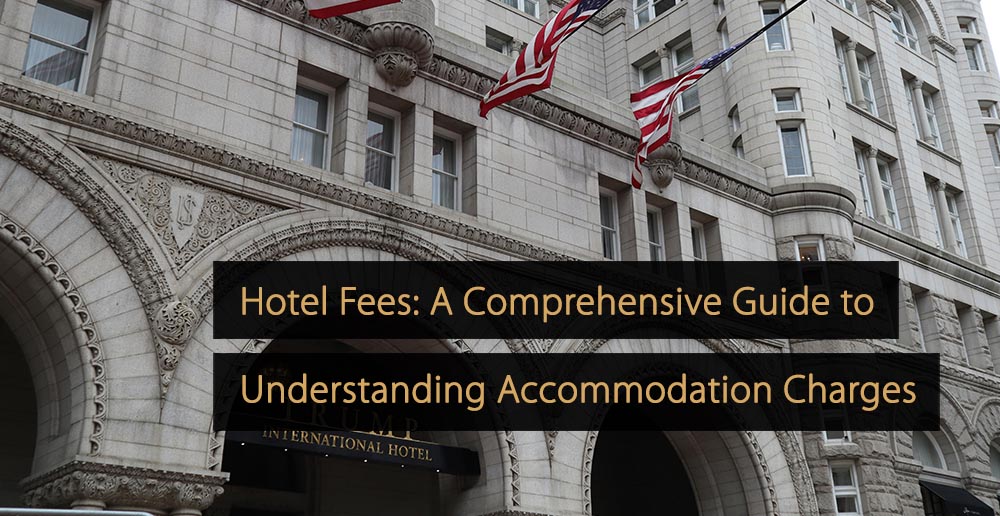A hotel business plan is essential for anyone starting a new enterprise in the hotel industry. A business plan is a document that identifies your goals, objectives, and success strategies. It will be the foundation for your new operation. In this article, you’ll learn how to create a detailed and effective business plan for your hotel.
Table of Contents:
- What Is the Hotel Industry?
- What Is a Hotel Business Plan?
- Why Is the Hotel Business Plan Important?
- Parts of a Full Hotel Business Plan
- Steps After Finalizing the Hotel Business Plan
- 4 Tips for Writing a Successful Hotel Business Plan
- Starting a Hotel Business: Factors to Consider
- Financing Your Hotel Business Plan to Fruition
- How to Start Your Own Hospitality Business
What Is the Hotel Industry?
Before discussing hotel business plans, it’s useful to consider the hotel industry and what it is. A hotel, meaning any establishment that offers overnight accommodation, is a part of the hotel industry. This can include everything from an independent bed-and-breakfast run by a family, to luxurious resort complexes operated by international hotel companies. The hotel industry forms part of the hospitality industry, which includes businesses such as restaurants, entertainment venues, and spas.
The hotel industry is arguably one of the oldest industries in the world, with facilities for short-term accommodation found in antiquity. It’s only relatively recently that hotels as we know them have come into being, starting with the rise in the stagecoach and becoming more prevalent with the advent of rail travel. Today, the hotel industry is a major economic force, employing millions of people. To learn more about the hotel industry, read “Hotel Industry: Everything You Need to Know About Hotels!“
What Is a Hotel Business Plan?
A hotel business plan comprises a detailed and thorough exploration of your business goals, objectives in running your hotel, and strategies to meet those goals and objectives. It will present your plans for building your business and developing it. Your business plan will include comprehensive market research.
A business plan is crucial, not just because you’ll need to present it to investors. A properly structured business plan will aid you in formulating and refining your business concept and determining the investment needed to turn your ideas into reality.
Why Is the Hotel Business Plan Important?
In studies, it’s been demonstrated that a proper business plan doubles your chances of success. Entrepreneurs who do not complete a business plan are half as likely to succeed. Your business plan is your roadmap to a successful hotel business, laying out the steps you’ll need to take and helping you identify potential obstacles before they become problematic. A business plan also helps establish your credibility as an entrepreneur, something that’s vital to securing investment in your company. If you can show banks and other investors that you have a clear blueprint for success, you’re more likely to receive their support.
Parts of a Full Hotel Business Plan
Your hotel business plan should include the following sections.
Executive Summary
The first section of your business plan should be the executive summary. This is a concise overview of your goals and objectives. The executive summary should be brief; one or two pages are fine. Your executive summary is also an opportunity to present your brand identity: your logo, brand colors, and font. This summary is perhaps the most vital part of your business plan. It should capture your business vision and enthusiasm for this project. A good executive summary can serve as a mission statement and a place to convey excitement for your new business.
Market, Competitor & Industry Analysis
This section will require you to investigate the hotel industry in your locale. You need information on the competition and the needs of your prospective customers. Consider the wider tourism and hospitality industries and how your hotel fits into those. Research into trends and other factors affecting the hospitality sector. Economic, political, environmental, and technological issues all affect the industry. How might they impact your business? How have similar businesses responded? Ask yourself what your hotel can offer that competitors don’t. Identify your hotel’s USP, and its unique selling point.
Hotel Services, Business, Operations & Marketing Presentation
In this section of your hotel business plan, you’ll summarize the amenities your hotel will offer and its services. You’ll develop a vision of what guests will experience at your hotel. You will also be detailing your hotel operations, and how they will function and generate income. Develop a list of key functions and responsibilities across your hotel departments and determine whether outsourcing is desirable. Create a marketing strategy to reach customers and present the right products at the right price. You will also need a distribution strategy: How will you sell and manage your rooms?
Hotel Financing Presentation
In your financing presentation, you’ll present a detailed breakdown of your hotel’s finances. This will cover the capital investment you need, how you’ll maximize revenue to maintain a profit, and the projected ROI (return on investment). You will need to decide on the business structure you want. Other elements of your financing presentation will include your overall business model, how much your hotel business will cost to start up, and the running costs. You will also need to consider accounting, tax, insurance, permits, and supplier relationships. It may be necessary to hire a finance professional to develop this section.
Steps After Finalizing the Hotel Business Plan
You can move on to the next stage once you’ve completed your hotel business plan. In this section, you’ll discover how to proceed.
Execute Your Hotel Business Plan
Before beginning the execution of your plan, it must be accurate in every detail. Check that there is nothing you’ve missed or failed to consider. Remember that your plan must also be flexible, as the needs of your guests will change continually. Although you should strive to work with your plan as much as possible, you can’t foresee everything and must be ready to adapt. Begin working through each step you’ve laid out in your plan, from securing initial hotel investment onwards. Be patient and stick to the order in which each step needs to be taken.
Track Progress & Make Necessary Adjustments
A hotel business plan also helps you to track your progress. As you work through your plan, you must regularly take stock of how things are progressing and analyze your situation. Refer often to the goals laid out in your business plan: your financial goals, targets for staffing, the number of guests expected at your hotel by a certain point, the implementation of hotel technology, etc. Are you meeting them in the timeframe you determined? By monitoring your progress and Making any necessary adjustments, you can keep your developing business on track.
Recruit & On-Board Good Staff
Every business needs quality staff. This doesn’t just mean having the right skills but aligning with the company culture. This is especially important for the hotel industry, where staff interact directly with your guests many times a day. Ensuring you hire excellent employees throughout all levels and hotel departments means value for your customers and an advantage over the competition. A hotel owner will often start by hiring hotel management and other leadership positions first, so that these team leaders can identify staffing needs and participate in recruitment. Don’t neglect onboarding and training for all your new staff.
Video: A Day in the Hotel Industry
Host a Hotel Launch Party
You’ve secured your hotel investments, acquired your premises, and assembled a great team. Everything is ready for your launch. A launch party for your hotel is an opportunity to promote your business, let guests know about your hotel, and connect with the local community. A launch party helps you to network with stakeholders and potential partners. It also helps attract the attention of influencers who can assist with your hotel social media marketing. Launch parties are crucial opportunities for hotel brands to establish themselves and present their vision to the world.
4 Tips for Writing a Successful Hotel Business Plan
In this section, you’ll discover four important tips to remember when developing your business plan.
Home In on Pre-Opening Strategies
The hotel market is crowded, and more hotel businesses open their doors daily. You need to make your hotel stand out from day one. That means offering an exceptional guest experience from the outset, securing positive reviews, and getting guests excited about your hotel. You need to ensure that your hotel operations are set for success, a process that should begin while construction is underway. Recruit the right staff and train them properly. Develop an operations blueprint so that every department works together effectively. Deploy your hotel technology beforehand, ensuring that any software is properly set up before you open.
Establish a Clear Target Customer
Identifying your target customer is crucial to the success of your hotel. You need to consider age, budget, job status, and why they’re choosing to visit your area. Suppose most guests are likely to be families, for example. In that case, you will want to provide facilities and amenities they’ll appreciate: pools, play areas, and family-sized rooms with additional beds. Young adults seeking an exciting city break will have different needs from busy professionals seeking a quiet retreat at a wellness spa. Find out what your guests need, strive to deliver it, and direct your hotel marketing to your target customer.
Craft and Include a SWOT Analysis
SWOT stands for Strengths, Weaknesses, Opportunities, and Threats. Performing a SWOT analysis is an important step, as it will provide crucial insight into your hotel business. By conducting a clear and open-minded appraisal of each element, you can better understand the possibilities and challenges you will likely face. For example, if your hotel is in a great location but hard to reach by rail and a long way from local airports, you could address this weakness by providing a hotel shuttle. You can even use your SWOT analysis to develop your hotel’s USP.
Video: Maximizing Hotel Marketing Strategy Through a Thorough Hotel SWOT Analysis | Hotel Marketing
Stay Realistic: Base Everything on Facts and Research
Proper research and analysis are essential for a business plan, especially regarding financial projections. You’ll deal with experienced lenders and investors who easily spot mistakes, overreaching, and poor research. Over-optimistic projections will make investors suspicious. At the same time, if you undersell your business and are too cautious with your projected ROI, this also looks bad, implying that you don’t understand your business. Realistic projections based on solid research and clear-headed analysis are vital to secure capital investment and beneficial partnerships.
Starting a Hotel Business: Factors to Consider
Now that you’re ready to begin crafting your business plan, you’ll want to know more about the industry and what it takes to start a new hotel enterprise. What kind of hotel business is right for you? Is building a hotel from scratch or adapting an existing property better? How do you identify a great hotel location? How can you learn from your competitors and outshine them? How do you go about recruiting and retaining quality staff for your hotel?
For an in-depth look at these and other important questions, read “Hotel Business: Factors to Consider When Starting a Hotel Business“ right now.
Financing Your Hotel Business Plan to Fruition
A major part of any business plan is financing: how much you’ll need, where you’ll secure it, and what type of financing is right for your situation. Raising the money you’ll require to start your business can be bewildering.
In “Hotel Financing: Learn How to Finance Your Hotel Business,” you’ll learn everything you need to know about financing your new business: where to start, who to approach, and how to present your business in the best possible light. From information on loans, grants, and private investments to key tips on securing funding, this is the article for you.
How to Start Your Own Hospitality Business
A hotel business is just one type of hospitality business that you could consider. Hospitality is a very diverse space, covering everything from restaurants, bars, and cafés to hotels, from travel agents to tour companies.
In “Hospitality Business: How to Start a Successful Hospitality Company,” you’ll discover many different ways you can enter this sphere as an entrepreneur. You’ll gain valuable advice on setting up a business from scratch, as well as exploring some of the many options for launching your own enterprise in the hospitality industry. You’ll learn which businesses will require the most initial outlay and which ones you could probably start right now.
Hotel Business Plan FAQs
Starting a new hotel business can be exhilarating, but it’s important not to let your enthusiasm get in the way of good planning. A detailed business plan will help you refine your ideas, identify opportunities, and foresee problems before they arise.
More Tips to Grow Your Business
Revfine.com is the leading knowledge platform for the hospitality and travel industry. Professionals use our insights, strategies, and actionable tips to get inspired, optimize revenue, innovate processes, and improve customer experience.Explore expert advice on management, marketing, revenue management, operations, software, and technology in our dedicated Hotel, Hospitality, and Travel & Tourism categories.
This article is written by:
Hi, I am Martijn Barten, founder of Revfine.com. With 20 years of experience in the hospitality industry, I specialize in optimizing revenue by combining revenue management with marketing strategies. I have successfully developed, implemented, and managed revenue management and marketing strategies for individual properties and multi-property portfolios.










Leave A Comment